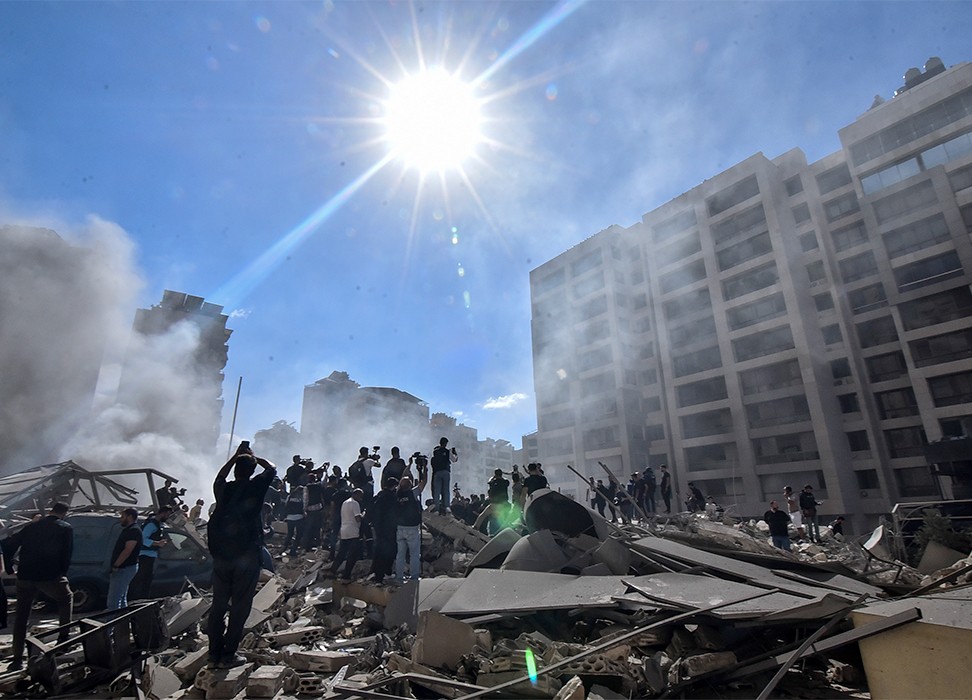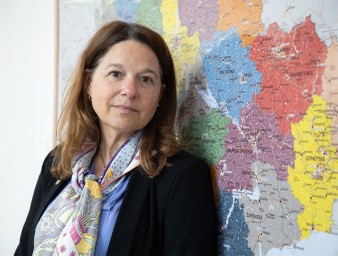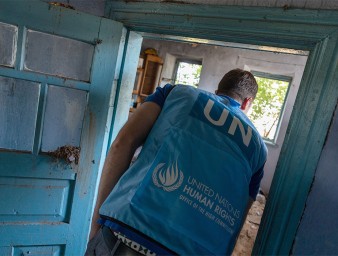Supporting the rights to peace, security and justice in the Middle East
18 October 2024

Hostilities in the Middle East are having a catastrophic impact on civilians, particularly women and children, people with disabilities and other vulnerable groups. Since 7 October 2023, tens of thousands have been killed, many more injured and millions have been displaced in a widening conflict that risks engulfing the entire region, potentially causing even more suffering and human rights violations and abuses.
UN Human Rights Chief Volker Türk has repeatedly urged all parties and States with influence to ensure the protection of civilians and the full respect for international law. He has also urgently called for a ceasefire to end the violence, for accountability, and for addressing the root causes of the conflict.
UN Human Rights has had a presence in the Middle East for many years under its mandate to promote and protect human rights, and has expanded its monitoring and reporting work, as well as its protection and humanitarian response, to address the current human rights and humanitarian crisis.
According to Ajith Sunghay, head of the UN Human Rights Office in the Occupied Palestinian Territory, the massive violations of human rights that are taking place within the region have broader, serious global implications.
Occupied Palestinian Territory
Following the attacks on 7 October 2023 by Hamas and other Palestinian armed groups in southern Israel and Israel’s intensive subsequent military campaign in Gaza, UN Human Rights in the Occupied Palestinian Territory has strengthened its monitoring and reporting work. The Office has an experienced team that collects testimonies and information from multiple sources for reports on human rights violations to increase accountability in Gaza and the West Bank.
“
The more we allow human rights violations to happen in one place, the more we can expect human rights violations to happen in other parts of the world.
“
AJITH SUNGHAY, HEAD OF THE UN HUMAN RIGHTS IN PALESTINE
The Office also leads a broad-based group of humanitarian actors (the Protection Cluster) that is charged with coordinating protection activities of international and national humanitarian and human rights actors, and advocates for human rights and international law in humanitarian action.
The Protection Cluster covers matters such as child protection, gender-based violence, mine action and legal aid. For example, the Office works with a range of partners, including UNICEF, on child protection issues for thousands of unaccompanied minors in Gaza. The Office also works with partners to set up safe spaces for women and girls who face the threat of sexual violence, provide psychosocial support to those in need, and engages with local NGOs to assist thousands of persons with disabilities who have been impacted by violence with the delivery of hearing aids and other medical devices.
“What we are monitoring and recording now is really the tip of the iceberg. It is simply impossible to cover all the violations that are happening in Gaza and in the West Bank due to the restrictions we face,” Sunghay said. The reports can be seen here.
Lebanon
With armed violence between Israel and Hezbollah recently escalating dramatically, UN Human Rights has adapted its operations in Lebanon to respond to the worsening human rights and humanitarian crisis, said Mazen Shaqoura, Regional Representative for the Middle East and North Africa (ROMENA). The UN Human Rights Regional Office, which covers 10 countries, is located in Lebanon, but most of its staff has been operating outside the country since October 2023 because of security concerns.
Despite limited resources and restricted access, the Office has stepped up its work of monitoring human rights violations, with a focus in the south of Lebanon and Beirut, where recent strikes have killed civilians and displaced hundreds of thousands inside Lebanon and into neighboring Syria, Shaqoura said. The Office is working with the Lebanese Red Crescent, local NGOs and human rights defenders, the Ministry of Health, and partners such as OCHA, WFP and UNHCR.
“We are focusing our monitoring work on civilian casualties and fatalities, damage to civilian infrastructure, and the compliance of parties with the principles of international human rights and humanitarian law,” said Shaqoura, adding the Office is also engaging with partners to ensure that humanitarian aid is distributed in accordance with human rights principles.
Despite the security situation, ROMENA is still operating and provides technical assistance and capacity building to States and civil society groups in the region on international human rights standards, including promoting human rights and tolerance and combating hate speech with a focus on young people, universities and religious leaders, Shaqoura said.
Syria
Set up in 2013, UN Human Rights in Syria monitors and reports on the human rights situation in Syria, highlighting emerging concerns and providing early warning analysis, including in relation to conditions of return in Syria. Hundreds of thousands of Syrian refugees have crossed into Syria since the escalation of the conflict in Lebanon in the last few weeks, and a majority of them are Syrians who had sought safety in Lebanon throughout the decade-long conflict.
The Office also supports the wider UN-led “whole of Syria” humanitarian response through the deployment of human rights advisors in humanitarian clusters. The human rights advisors support the leadership of the humanitarian response, the Resident Coordinators and the UN Country Teams, so that attention is provided to the most vulnerable when it comes to the right to food, health, education, housing, water and sanitation, said Abdelaziz Abdelaziz, Officer in Charge at Human Rights Syria.
Following the earthquakes that devastated south-eastern Türkiye and northern Syria in February 2023, UN Human Rights advisors were deployed in affected areas to produce firsthand analysis on the humanitarian and human rights situation and identify gaps so that vulnerable groups were not left behind.
The Office works closely with civil society inside and outside Syria in capacity training.
Yemen
In Yemen, 17 staff from UN agencies, including eight OHCHR colleagues, and a large number of employees of civil society organizations, are being arbitrarily detained by de facto authorities. UN Human Rights Chief Volker Türk, alongside other senior UN leaders, has demanded their immediate and unconditional release, and the release of all human rights and humanitarian workers similarly arrested and detained without legal protections.
The UN Human Rights Office in Yemen works to promote the human rights of all Yemenis. This has included monitoring the impact of conflict and violence on civilians, including by documenting deaths, injuries, destruction of essential infrastructure and the capacity of the Yemeni people to earn their livelihoods. The Office’s work also focuses on promoting the rights of vulnerable groups, like women, children, people with disabilities, older people and minorities.
“
UN Human Rights is doing its job of pointing to human rights violations in the region, but Member States and the international community need to do their part: There needs to be political will to uphold the UN charter, end the violence and ensure justice and accountability.
“
ABDELAZIZ ABDELAZIZ, OFFICER IN CHARGE AT UN HUMAN RIGHTS SYRIA



